You want the ants out of your living space, but crushing them or spraying them with pesticides seems too cruel. Isn’t there a better, more humane way to remove them from your home? The answer is: yes, there definitely is!
So, how to get rid of ants without killing them? You can do so by ensuring you have a clean home, applying natural repellents in areas frequented by ants, and making sure cracks and openings around your house are properly sealed.
To know more information about how you can get rid of ants ethically, why you shouldn’t kill them, and how they can be a danger to your health, read further this article!
Getting Rid of Ants Without Killing Them: Step by Step Guide
Step 1: Address the Reasons Why Ants Have Invaded Your House
Before anything else, you must know why ants have started their infestations in the first place. Cover each of these points to ensure that the ants don’t continue to find food in your home.
Check All the Food Stored in Your Home

This includes any food stored in your pantry, on your countertops, in drawers, in your cellar, or garage. Be sure that these items are sealed up completely. Any opened food should be stored in sealed plastic bags or other containers.
Be sure to check unopened goods and ensure that the packaging isn’t damaged. Once all food items are correctly stored, check the outside containers for any drips or food residue.
To be safe, use warm soapy water to wipe down the outside of food containers. If you can, store fruits and vegetables in the refrigerator. If you have pet bowls in the house, be sure to empty and wash them after each meal.
Clean Your Home Thoroughly
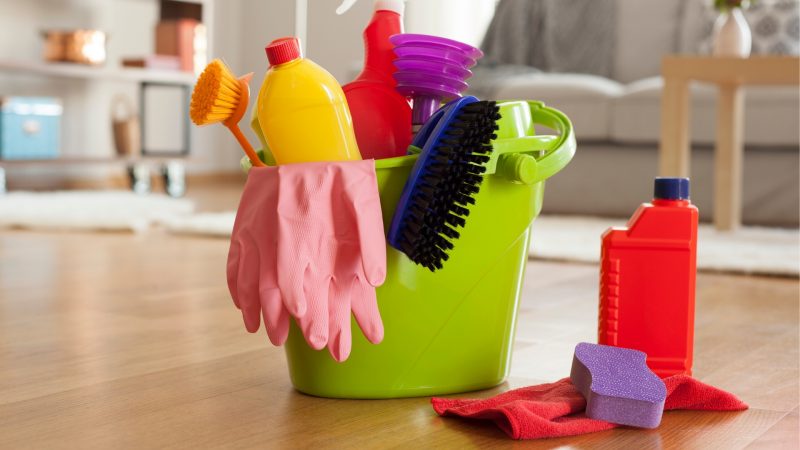
First, wipe down all the countertops and tables in your home. Use warm soapy water to ensure that any stuck-on food is removed completely. Also, check your oven, microwave, and toaster inside and out for crumbs or food residue.
Afterwards, use a 1:1 mixture of vinegar and water to spray and wipe down countertops. This will ensure that all pheromone trails are erased. If you have marble or granite countertops, skip this step, as vinegar can damage these surfaces.
After you’ve wiped down all surfaces, vacuum your entire home thoroughly. Use an attachment to get into cracks and crevices where food crumbs might be hiding. Don’t forget to do the same to furniture and other upholstery.
Take out the Trash
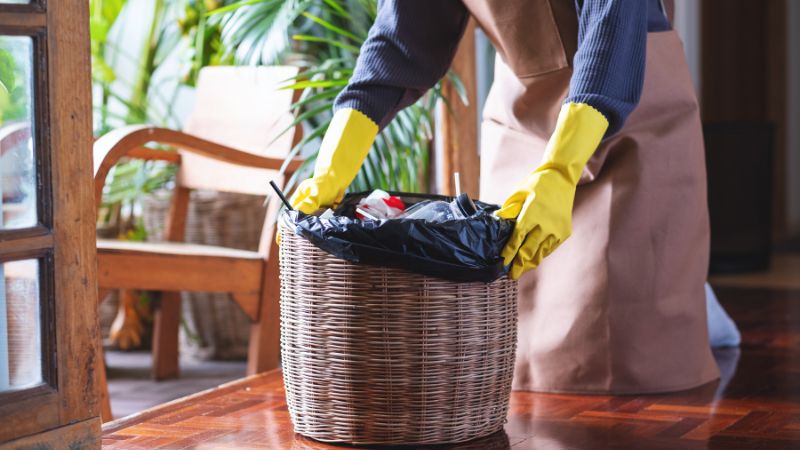
Even small traces of food on packaging can attract ants to your garbage can. Empty your kitchen trash can daily to avoid allowing ants to find it, and keep an eye on the trash can itself. Regularly wipe the inside and outside of your trash can to keep it free from food residue.
Physically Remove Ants Without Killing Them
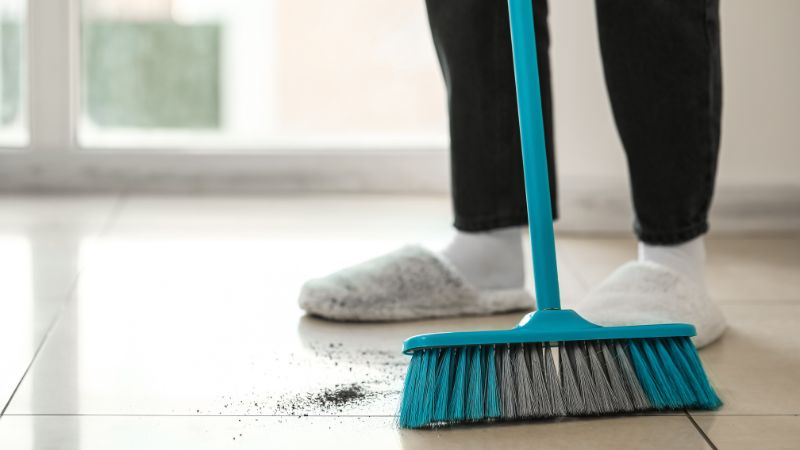
Use a dustpan brush or broom with soft bristles and brush over the ants slowly and gently. Once they’re caught up in or hung onto the bristles, shake the broom rigorously outside to remove the ants. You can also just simply leave the broom or brush outside for a short time to allow the ants to crawl off by themselves.
Step 2: Use Ant Deterrents
Several products deter ants but won’t kill them if you use them properly and according to the directions stated at their label. Let’s look at these options and how to use them in more detail:
Orange Guard
This product is specially formulated with all-natural, organic plant extracts with orange peel extract as the active ingredient, making it as an effective ant deterrent without harsh chemicals.
No products found.
Remember not to spray this product directly on the ants as it will kill them immediately. Simply spray it around ant entry points or anywhere else you have found ants in your home.
Not only does this product deter ants, but it also repels other insects such as cockroaches, fleas, silverfish, and more. It’s also safe to use in any part of your home, including your very own kitchen.
Mint Leaves
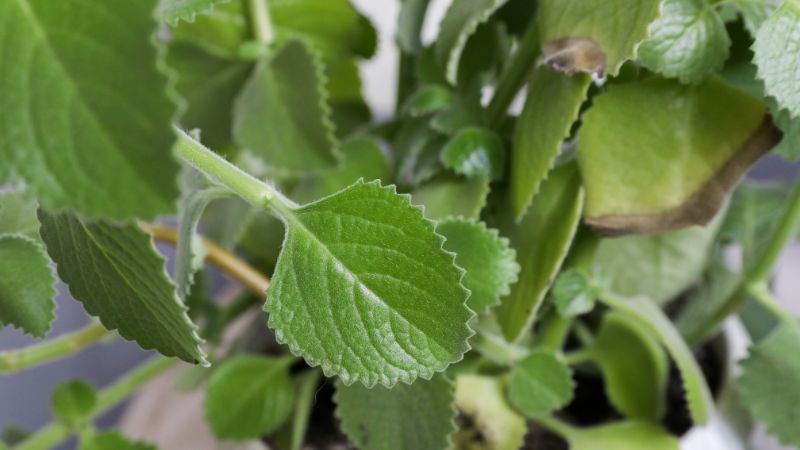
Ants do not like the scent of mint and will avoid mint leaves entirely. Bundle mint leaves together and place them inside cupboards and other places you have found ants wandering your home.
Eucalyptus, Peppermint and Citrus Oil
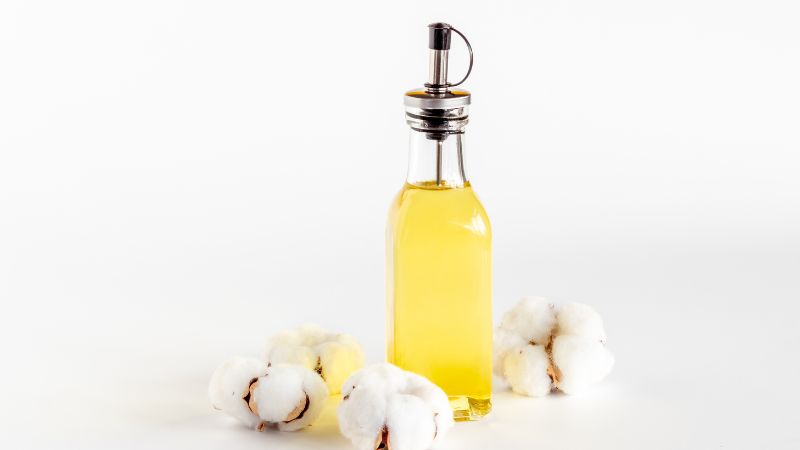
Drip 4-5 drops of oil onto a cotton ball and place it inside cabinets, cupboards, or any other areas of your home where you see ants. Replace the cotton ball every two days to ensure the scent stays strong.
Vinegar
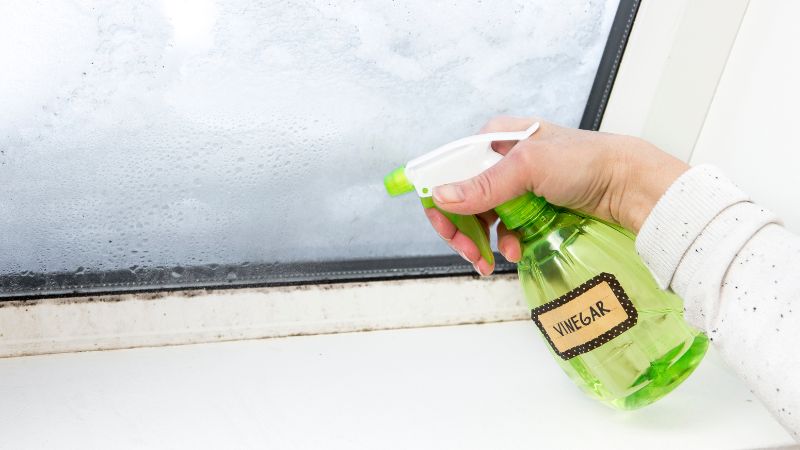
Vinegar is not just effective in removing pheromone trails—it also works as an ant deterrent due to its pungent odor. Using the same vinegar and water mixture from earlier, wipe down kitchen surfaces (except for marble or granite).
Step 3: Make Sure Your Doors and Windows Are Sealed Properly
We all know how tiny ants are; they can fit through even the smallest cracks around doors and windows. Do a quick check around the perimeter of all your doors and windows. If you see any cracks, seal them using caulk or weather stripping.
More Reasons Not to Kill Ants
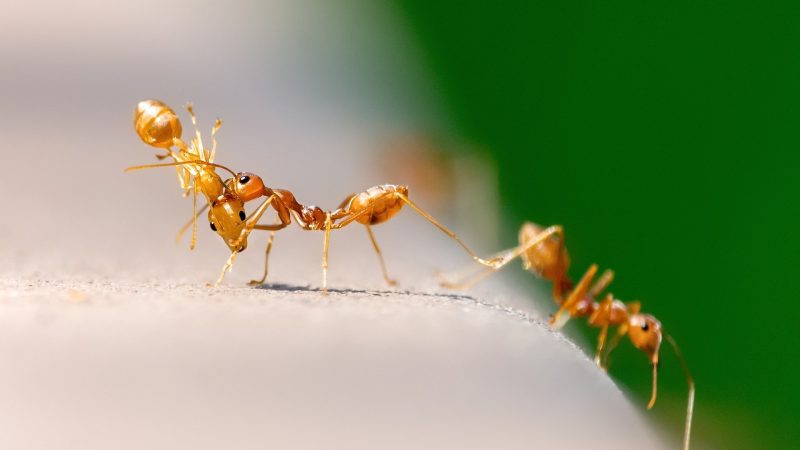
If you’re still on the fence about whether or not to kill the ants in your home, here are a few more reasons not to. We have also written a separate article on how dangerous ants are. Read both of them and make up your mind.
1. They Are Good for Your Garden
While ants are building their nests underground or searching for food, they’re also aerating the soil. Aeration means creating tiny holes in the soil, allowing air, rainwater, and other nutrients inside. This produces healthier soil which is more likely to grow hardy grass and flourishing plants.
Related: Ants in Garden: Are Ants Good for Plants in Your Garden?
2. They Are a Valuable Part of Your Local Ecosystem
Ants are an essential food source for some animals, making them a crucial part of the food chain and ecosystem. If you care about the environment, you probably also care about ants.
3. Ants Are Fascinating Creatures
If you spend even a short time observing ants, you’ll begin to understand just how fascinating these tiny creatures are. If simply watching them doesn’t convince you, here are a few intriguing facts about ants.
- Ants are, concerning their size, one of the strongest animals on the planet.
- Queen ants can live up to 30 years.
- Ants take good care of their young, feeding and tending to them until they become an active part of the colony.
- Ants injured outside the nest don’t have a great chance of survival. Remarkably, some species of ants will find their injured comrades and rescue them – carrying them safely back to the nest where they can recover.
Can Ants Cause Danger to Your Health?
While it is not common, ants can transmit diseases such as salmonella and E. coli. This is why food that has come in contact with ants must be disposed of properly.
Ants can also bite or sting, which can cause problems for people who may be allergic, such as swelling or difficulty breathing. If this happens, contact professional help immediately.
Another potential concern regarding ant bites or stings is the possibility of infection. In this case, keep the area clean and be sure not to scratch. Scratching could cause tears in the skin and introduce bacteria into the bite, which leads to infection.
Related: How to Get Rid of Ants | Safe and Effective Methods
List of Sources
Cremer, S., Ugelvig, L. V., Drijfhout, F. P., Schlick-Steiner, B. C., Steiner, F. M., Seifert, B., … Boomsma, J. J. (2008), The evolution of invasiveness in garden ants.
Iowa State University. (n.d.). Ants Are Ecologically Beneficial.
Farji-Brener A., & Werenkraut V. (2017). The effects of ant nests on soil fertility and plant performance: a meta‐analysis.
Jessica Tay Ying Ling. (2018). Ants Can Feed Plants.
Oregon Metro News. (2016). Got ants? Safer ways to prevent and eliminate this common home pest.
Sonora Environmental Research Institute. (n.d.). Some Natural Pesticide Alternatives.
- Bed Bug Surge 2025: How to Detect, Prevent, and Safely Eliminate Infestations in Top U.S. Cities - June 18, 2025
- Asian Needle Ants Invade US Homes: 2025 Guide to Identification, Risks, and Effective Control - June 11, 2025
- New World Screwworm Alert: How US Livestock Owners Can Prevent Outbreaks and Protect Herds [Summer 2025 Update] - June 8, 2025

